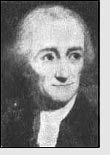When first describing George Read, a delegate from Delaware, in Plain, Honest Men (2009) Richard Beeman notes that the delegate gave a “clear signal of serious trouble down the the road” just as the Convention began (71). This “trouble” pertained to the issue of state representation and Read’s need to preserve Delaware’s equal power in the proposed revisions to the government. Beeman portrays Read as having a complicated position in the Convention, for he favored proposals for the supremacy of a national government and chief executive while upholding his state’s commission to maintain equal representation. This latter viewpoint evoked a passionate response from Read at one point in the Convention’s deliberation, at which point he threatened the delegation from Delaware would leave the Convention if proposals for proportional representation continued.
Beeman provides details about George Read given his significance as a representative of small-state interests during a heated debate over representation. The American National Biography Online provides a more detailed biography of Read beyond his political acheivements noted by Beeman (e.g. Read signed of the Declaration of Independence and went on to become a leader in Delaware’s government). In addition, modern scholarship by John Munroe offers insight into Read’s prominent status as a government leader and a merchant, and his political connections to Philadelphia and Delaware. Furthermore, Read’s social and economic status fueled his interest to stake claims in western territories. Since only a strong, centralized government could prevent other larger states to claim these territories, Read soon voiced his support for a new government. In short, his position in the Convention quickly brought the issue of representation to the forefront, but his motivations were varied.

